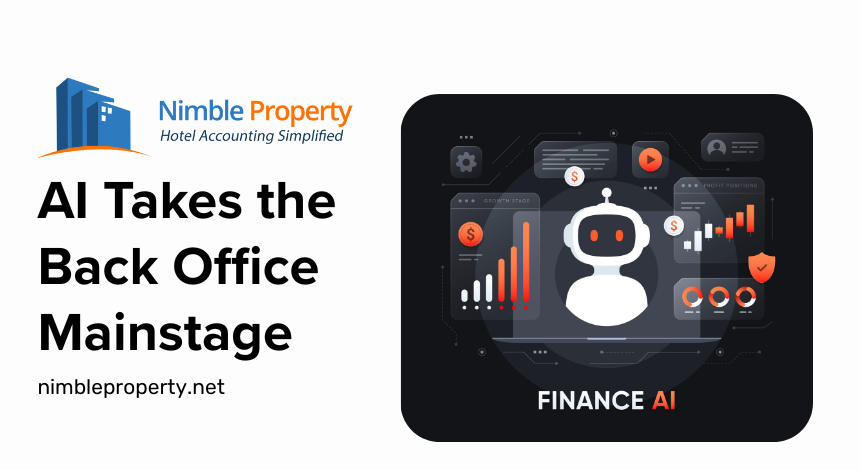A silent transformation is occurring behind the scenes—in the hotel accounting departments—in an industry where the guest experience has historically taken center stage. Hotel accounting is changing dramatically as artificial intelligence (AI) becomes more prevalent in hospitality operations. AI is a current competitive advantage that may be used for anything from fraud detection to invoice processing.
The transformation in this sector is not rapid, initially it was books, computer systems – spreadsheets, Hotel Accounting System and much advanced data driven, AI enabled Hotel Accounting Software, where hoteliers can embrace any kind of uncertainty in the day-to-day business operations.
They have solutions for fluctuating prices, reconciliation process, invoice automation and more, artificial intelligence is capacitated to solve any problem based on the queries.
This blog gives general ideas on Hotel Accounting System and its advancements in the hospitality industry.
Spreadsheets to Smart Systems: An Improvement in Hotel Accounting
Hotel accounting has always been a labor-intensive, multi-layered process that includes bill approvals, reconciliation, compliance, and vendor management. Many hoteliers continue to use manual entry or disjointed systems, which slow down procedures and leave financial operations vulnerable to fraud and human mistake.
Where Artificial Intelligence Steps In?
AI is currently being used by contemporary hotel accounting systems to optimize back-office tasks, particularly in domains that involve a lot of data, rules, and repetition. By doing this, they are changing the definition of effective financial management for lodging establishments of all sizes.
Handling Invoices: From Email to Books in a Matter of Seconds
One of the most significant developments in hotel finance today is probably AI-powered invoice processing. In the past, invoices needed to be manually scanned, tagged, and checked; this frequently involved comparing them to vendor terms, approval structures, and purchase orders.
Invoices are automatically read, categorized, and compared to pre-existing records using AI and OCR. In addition to extracting important data fields (such as the vendor’s name, amount, due date, and GL codes), intelligent algorithms also learn from previous entries to gradually increase accuracy.
Result: Reduced processing time from days to minutes, improved accuracy, and real-time visibility into payables.
Fraud Detection: Leaving the Books to AI Guard
Duplicate invoices, unapproved vendor payments, or erratic approval processes are frequently the root causes of fraud in hotel accounting. Particularly when overseeing several properties, manually identifying such anomalies is like trying to find a needle in a haystack.
However, pattern recognition is where AI shines. AI tools can identify anomalous activities by continuously tracking transactions between properties and vendors, including:
- Bills that are submitted outside of regular cycles
- Amounts that differ from historical norms
- Variability in vendor information or tax IDs
As more data is processed by machine learning models, fraud detection becomes more proactive and intelligent over time.
The outcome is peace of mind for hotel owners and finance heads, early fraud alarms, and decreased risk exposure.
Beyond the Books: Smarter Decision-Making
AI has an impact on hotel accounting that goes beyond automation. By examining patterns across properties, vendors, and time periods, it also makes deeper financial insights possible. Imagine dashboards that use past patterns to forecast future cash flow problems in addition to displaying AP aging information.
With AI at the center, finance staff can become strategic consultants rather than just mathematicians, with real-time insights to help with forecasting, investment decisions, and budgeting.
The Path Ahead: Combining AI and Human Knowledge
Although AI is revolutionizing hotel accounting procedures, human judgment is still necessary. Rather, it intensifies it. To concentrate on high-value responsibilities like financial strategy, compliance planning, and vendor negotiations, accountants and controllers are released from monotonous duties.
The hotels adopting AI today aren’t just modernizing their operations, they are future proofing their business. As technology continues to evolve, embracing AI in accounting will be less of a differentiator and more of a necessity.
Conclusion:
An important turning point for accounting is the emergence of AI in hotel operations. What used to be a laborious, prone to mistakes procedure has evolved into a clever, flexible system that can adapt to the needs of contemporary hospitality.
To keep ahead of the competition, hoteliers are being asked how quickly they can implement AI in accounting rather than whether they should.
Don’t wait to catch up. Lead the change.
📅 Schedule your free demo with Nimble Property today and see how AI can transform your hotel’s financial future.

